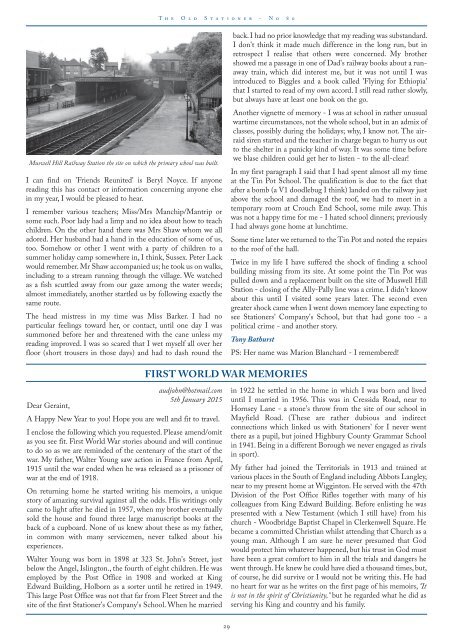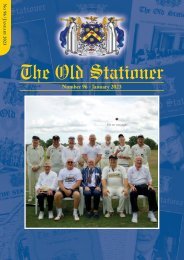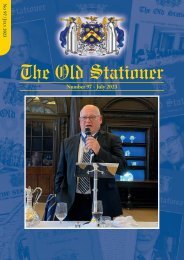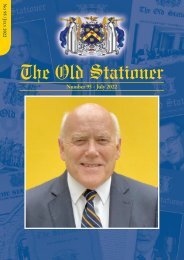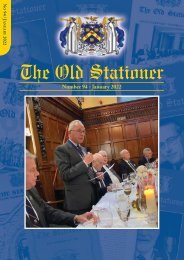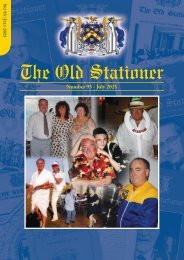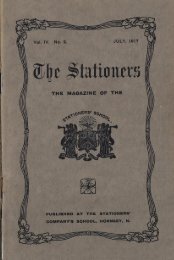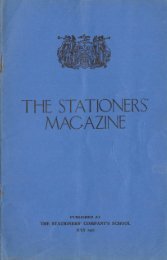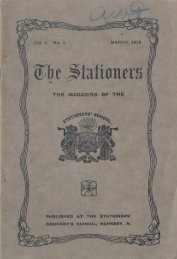OSAmag80
Create successful ePaper yourself
Turn your PDF publications into a flip-book with our unique Google optimized e-Paper software.
T h e O l d S t a t i o n e r - N o 8 0<br />
Muswell Hill Railway Station the site on which the primary school was built.<br />
I can find on 'Friends Reunited' is Beryl Noyce. If anyone<br />
reading this has contact or information concerning anyone else<br />
in my year, I would be pleased to hear.<br />
I remember various teachers; Miss/Mrs Manchip/Mantrip or<br />
some such. Poor lady had a limp and no idea about how to teach<br />
children. On the other hand there was Mrs Shaw whom we all<br />
adored. Her husband had a hand in the education of some of us,<br />
too. Somehow or other I went with a party of children to a<br />
summer holiday camp somewhere in, I think, Sussex. Peter Lack<br />
would remember. Mr Shaw accompanied us; he took us on walks,<br />
including to a stream running through the village. We watched<br />
as a fish scuttled away from our gaze among the water weeds;<br />
almost immediately, another startled us by following exactly the<br />
same route.<br />
The head mistress in my time was Miss Barker. I had no<br />
particular feelings toward her, or contact, until one day I was<br />
summoned before her and threatened with the cane unless my<br />
reading improved. I was so scared that I wet myself all over her<br />
floor (short trousers in those days) and had to dash round the<br />
back. I had no prior knowledge that my reading was substandard.<br />
I don't think it made much difference in the long run, but in<br />
retrospect I realise that others were concerned. My brother<br />
showed me a passage in one of Dad's railway books about a runaway<br />
train, which did interest me, but it was not until I was<br />
introduced to Biggles and a book called 'Flying for Ethiopia'<br />
that I started to read of my own accord. I still read rather slowly,<br />
but always have at least one book on the go.<br />
Another vignette of memory - I was at school in rather unusual<br />
wartime circumstances, not the whole school, but in an admix of<br />
classes, possibly during the holidays; why, I know not. The airraid<br />
siren started and the teacher in charge began to hurry us out<br />
to the shelter in a panicky kind of way. It was some time before<br />
we blase children could get her to listen - to the all-clear!<br />
In my first paragraph I said that I had spent almost all my time<br />
at the Tin Pot School. The qualification is due to the fact that<br />
after a bomb (a V1 doodlebug I think) landed on the railway just<br />
above the school and damaged the roof, we had to meet in a<br />
temporary room at Crouch End School, some mile away. This<br />
was not a happy time for me - I hated school dinners; previously<br />
I had always gone home at lunchtime.<br />
Some time later we returned to the Tin Pot and noted the repairs<br />
to the roof of the hall.<br />
Twice in my life I have suffered the shock of finding a school<br />
building missing from its site. At some point the Tin Pot was<br />
pulled down and a replacement built on the site of Muswell Hill<br />
Station - closing of the Ally-Pally line was a crime. I didn't know<br />
about this until I visited some years later. The second even<br />
greater shock came when I went down memory lane expecting to<br />
see Stationers' Company's School, but that had gone too - a<br />
political crime - and another story.<br />
Tony Bathurst<br />
PS: Her name was Marion Blanchard - I remembered!<br />
First world war memories<br />
audjohn@hotmail.com<br />
5th January 2015<br />
Dear Geraint,<br />
A Happy New Year to you! Hope you are well and fit to travel.<br />
I enclose the following which you requested. Please amend/omit<br />
as you see fit. First World War stories abound and will continue<br />
to do so as we are reminded of the centenary of the start of the<br />
war. My father, Walter Young saw action in France from April,<br />
1915 until the war ended when he was released as a prisoner of<br />
war at the end of 1918.<br />
On returning home he started writing his memoirs, a unique<br />
story of amazing survival against all the odds. His writings only<br />
came to light after he died in 1957, when my brother eventually<br />
sold the house and found three large manuscript books at the<br />
back of a cupboard. None of us knew about these as my father,<br />
in common with many servicemen, never talked about his<br />
experiences.<br />
Walter Young was born in 1898 at 323 St. John's Street, just<br />
below the Angel, Islington., the fourth of eight children. He was<br />
employed by the Post Office in 1908 and worked at King<br />
Edward Building, Holborn as a sorter until he retired in 1949.<br />
This large Post Office was not that far from Fleet Street and the<br />
site of the first Stationer's Company's School. When he married<br />
in 1922 he settled in the home in which I was born and lived<br />
until I married in 1956. This was in Cressida Road, near to<br />
Hornsey Lane - a stone's throw from the site of our school in<br />
Mayfield Road. (These are rather dubious and indirect<br />
connections which linked us with Stationers' for I never went<br />
there as a pupil, but joined Highbury County Grammar School<br />
in 1941. Being in a different Borough we never engaged as rivals<br />
in sport).<br />
My father had joined the Territorials in 1913 and trained at<br />
various places in the South of England including Abbots Langley,<br />
near to my present home at Wigginton. He served with the 47th<br />
Division of the Post Office Rifles together with many of his<br />
colleagues from King Edward Building. Before enlisting he was<br />
presented with a New Testament (which I still have) from his<br />
church - Woodbridge Baptist Chapel in Clerkenwell Square. He<br />
became a committed Christian whilst attending that Church as a<br />
young man. Although I am sure he never presumed that God<br />
would protect him whatever happened, but his trust in God must<br />
have been a great comfort to him in all the trials and dangers he<br />
went through. He knew he could have died a thousand times, but,<br />
of course, he did survive or I would not be writing this. He had<br />
no heart for war as he writes on the first page of his memoirs, "It<br />
is not in the spirit of Christianity," but he regarded what he did as<br />
serving his King and country and his family.<br />
29


